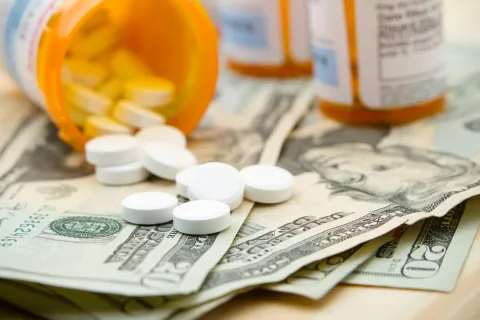Of course a tax-based public health dystem has lower costs pro capita than an insurance-based system.
A public health system operates in permanent loss and is one of the most significant causes of the continuously-increasing public debt of European countries. Here in Italy public health is by far the biggest contributor to public debt.
Instead in an insurance-based system both insurance companies and hospitals operate with significant profit. This means that citizens are paying more than the net cost, whilst here we are paying less than the net cost.
Furthermore the tax-based system is strongly progressive, ensuring that only the rich pay a lot, whilst everyone gets the same good medical treatment.
An insurance based system ensures good treatment only to the rich, whilst poor people only receive basic healthcare and are excluded from top level treatments.
The way to discourage unhealthy behaviour is to tax it heavily.
Here we have a lot of taxation on tobacco and alcohol...
The biggest obstacle I see in the American health care system is the insurance industry sitting right between the patient and the doctor.
One very simple example: I’m self employed and have to buy my own insurance. I say “have to” because if I don’t I get fined. In California we are forced to buy medical insurance or else we pay a fine at the end of the year through out income taxes. So at 60 years old the cheapest insurance I can find through the insurance market is about $1000 a month. I still have to pay about $7000 out if pocket before the deductible is met if something serious happens. The $1000 mo. covers nothing, that’s just for access. I still have to pay a lot of money.
My office visits are $150 each time I go in. The only thing fully covered is annual physical check up.
So for $12,000 a year I don’t get much.
If I wanted a premium plan I would have to pay about $2000 mo for a $30 office visit and a $2500 deductible.
I get skin basel cell carcinomas from too much sun in my life and my dermatologist doesn’t take Obama care. So I just pay out of pocket every time I go in which is $95 office visit then between $200-$400 for procedures. She’s really good. If I went through my medical plan the other options are very dismal. My plan has a list of so called “covered doctors” which aren’t really covered, they are just the ones who will take this insurance plan. It’s cheaper for me to pay her out of pocket for minor skin care because if she did take my insurance I would have to pay a jacked up rate, office visit would be $150 and they would only pay her probably $60-$70 of that, they keep the rest. Insurance companies are making all the money in this whole scam, and they are holding back care to maximize profits.
I would love to keep the grand a month and just pay out if pocket but Obama won’t let me. I have to pay for every other poor person who doesn’t want to work, and I’m not a rich man by any means.
I see this whole thing as catastrophic on so many levels.
My personal health plan is just to stay healthy, continue to eat well, work out, and dive as much as possible. I absolutely cannot afford to get sick.
Hopefully I will never need to be on any expensive prescriptions.




